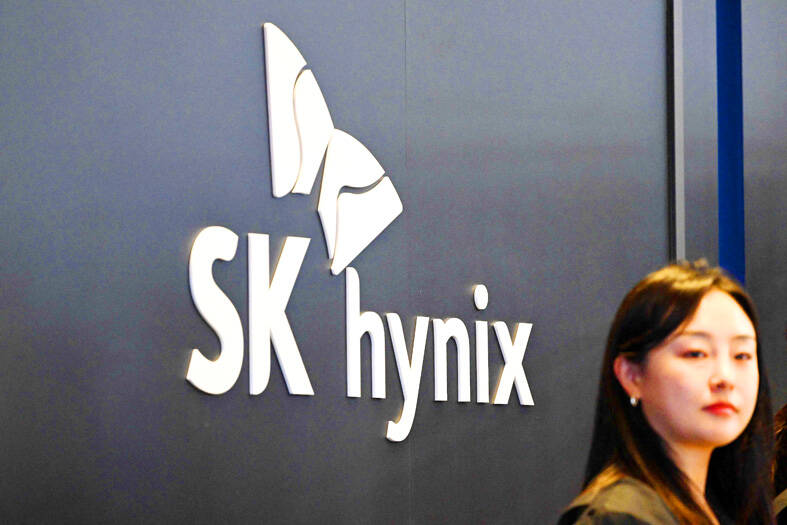South Korea’s SK Hynix Inc, the world’s second-largest maker of memory chips, yesterday said that some customers have brought forward orders in preparation for new US tariffs on semiconductors.
Speaking at the company’s annual shareholders’ meeting, SK Hynix head of global sales and marketing Lee Sang-rak said the “pull-in” effects, along with the reduction in customers’ inventory, led to favorable market conditions.
However, he added that it remains to be seen whether the trend would continue.

Photo: Jung Yeon-je, AFP
The US’ Micron Technology Inc and SanDisk Corp, and China’s Yangtze Memory Technologies Co (長江存儲) have raised their chip prices, partly due to robust demand from the artificial intelligence (AI) market, media reports said.
US President Donald Trump has said he intends to impose tariffs on imports of semiconductors and some other products “in the neighborhood of 25 percent.”
“Fears that the US may impose semiconductor tariffs in April have led to pre-emptive transfers of semiconductor inventory to the United States,” Nomura Holdings Inc said in a report this week.
“It is not yet known if the tariffs will actually be imposed; if this materializes, it could lead to higher prices for set products, which could dampen demand,” it added.
SK Hynix expects “explosive growth” in high bandwidth memory (HBM) chips demand this year, backed by investments in data centers, company CEO Kwak Noh-jung told shareholders.
In January, SK Hynix forecast that sales of its HBM chips would more than double this year.
“Our HBM sales for 2025 have already been sold out, and we plan to finalize sales with customers for the 2026 volume within the first half of this year to further strengthen revenue stability,” Kwak said.
While doubts around a slowdown in spending on AI hardware emerged in January following DeepSeek’s (深度求索) claims that it had developed AI models rivaling Western counterparts at a fraction of cost, Nvidia last month signaled that its AI chip demand was intact.
Kwak saw DeepSeek’s emergence as ultimately beneficial.
“This could likely have a positive impact on medium to long-term demand for AI memory chips. From our perspective, we don’t see DeepSeek slowing down demand for high-performance accelerators or HBM,” Kwak said.

In Italy’s storied gold-making hubs, jewelers are reworking their designs to trim gold content as they race to blunt the effect of record prices and appeal to shoppers watching their budgets. Gold prices hit a record high on Thursday, surging near US$5,600 an ounce, more than double a year ago as geopolitical concerns and jitters over trade pushed investors toward the safe-haven asset. The rally is putting undue pressure on small artisans as they face mounting demands from customers, including international brands, to produce cheaper items, from signature pieces to wedding rings, according to interviews with four independent jewelers in Italy’s main

Japanese Prime Minister Sanae Takaichi has talked up the benefits of a weaker yen in a campaign speech, adopting a tone at odds with her finance ministry, which has refused to rule out any options to counter excessive foreign exchange volatility. Takaichi later softened her stance, saying she did not have a preference for the yen’s direction. “People say the weak yen is bad right now, but for export industries, it’s a major opportunity,” Takaichi said on Saturday at a rally for Liberal Democratic Party candidate Daishiro Yamagiwa in Kanagawa Prefecture ahead of a snap election on Sunday. “Whether it’s selling food or

CONCERNS: Tech companies investing in AI businesses that purchase their products have raised questions among investors that they are artificially propping up demand Nvidia Corp chief executive officer Jensen Huang (黃仁勳) on Saturday said that the company would be participating in OpenAI’s latest funding round, describing it as potentially “the largest investment we’ve ever made.” “We will invest a great deal of money,” Huang told reporters while visiting Taipei. “I believe in OpenAI. The work that they do is incredible. They’re one of the most consequential companies of our time.” Huang did not say exactly how much Nvidia might contribute, but described the investment as “huge.” “Let Sam announce how much he’s going to raise — it’s for him to decide,” Huang said, referring to OpenAI

The global server market is expected to grow 12.8 percent annually this year, with artificial intelligence (AI) servers projected to account for 16.5 percent, driven by continued investment in AI infrastructure by major cloud service providers (CSPs), market researcher TrendForce Corp (集邦科技) said yesterday. Global AI server shipments this year are expected to increase 28 percent year-on-year to more than 2.7 million units, driven by sustained demand from CSPs and government sovereign cloud projects, TrendForce analyst Frank Kung (龔明德) told the Taipei Times. Demand for GPU-based AI servers, including Nvidia Corp’s GB and Vera Rubin rack systems, is expected to remain high,